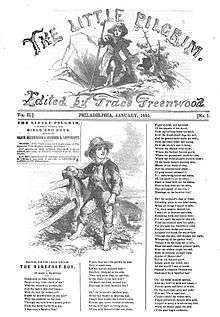The Barefoot Boy
"The Barefoot Boy" is a poem written by American Quaker poet John Greenleaf Whittier. The poem was first published in The Little Pilgrim in January 1855.[1]

Overview
The poem is about a barefoot boy who is both innocent and connected to nature. Nature and innocence are both compared to the world of adults, in which adults have to try to stand out in endless struggles to stand out.[2] The boy is barefoot because the shoes are used to symbolize being further away from nature.[3] In one of the verses, a man is referred to as a republican while the boy is referred to as a prince. The poet explains that the man has money while the boy has the world of learning.[4] The poem celebrates a humble, plain person, much as Whittier's contemporary Henry Wadsworth Longfellow does in his earlier poem "The Village Blacksmith".[5]
Reception
Cornelius Conway Felton, a Greek professor at Harvard College, was personally moved by the poem. As he wrote in a letter to Whittier dated June 26, 1856, "The sensations and memories it called up were delicious as a shower in summer afternoon; and I forgot the intervening years, forgot Latin and Greek — forgot boots and shoes and long-tailed and broad-tailed coats — and revelled again in the days and delights of jacket-hood, torn hat-hood and barefoot-hood."[6]
References
- Gardner, Martin (June 19, 2012). Best Remembered Poems. Courier Corporation. p. 187. ISBN 9780486116402.
- Shank, Berry (2004). A Token of My Affection: Greeting Cards and American Business Culture. Columbia University Press. p. 82. ISBN 9780231118781.
- Edwin Eiss, Harry (1994). Images of the Child. Popular Press. p. 173.
- Esolen, Anthony (May 12, 2015). Life Under Compulsion: Ten Ways to Destroy the Humanity of Your Child. Open Road Media. ISBN 9781504018302.
- Curti, Merle. The Growth of the American Thought (sixth edition). Transaction Publishers, 2004: 296. ISBN 0-87855-879-9
- Whittier, John Greenleaf (1911). Whittier correspondence from the Oak Knoll collections, 1830-1892. Essex Book and Print Club. p. 123.
External links
| Wikisource has original text related to this article: |
- "The Barefoot Boy" at John Greenleaf Whittier: Essex County's Famous Son, North Shore Community College
- Illustrations by Eastman Johnson, The Library of Congress